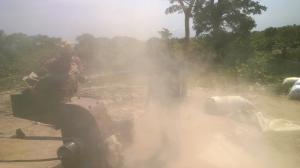
Safer Mining Practices Reduce Hazardous Exposures in Small-scale Mining in Nigeria
Safer mining project reduces toxic lead exposures among artisanal small-scale miners in Niger State.
“Our pilot project demonstrated that low-cost dust control measures were effective at reducing average airborne lead exposures by 95 per cent,” said Perry Gottesfeld, Executive Director of Occupational Knowledge International (OK International) whose organization partnered with Doctors Without Borders/ Médecins Sans Frontières (MSF) in this effort.
The safer mining project took place in the Shakira community in Niger State where high levels of lead are naturally present in the gold ore. The primary objective was to reduce lead exposures among artisanal small-scale miners and minimize take-home exposures.
“We worked cooperatively with miners to provide them with the information and tools to reduce their exposures to lead and silica dust. Together we showed that these efforts minimized contamination and helped save lives.” Gottesfeld said.
The organization demonstrated the effectiveness of reducing airborne lead levels by working with miners to convert dry operations into wet methods. Water spray misting was proven to be highly effective while minimizing water consumption. In addition to significant reductions in the airborne lead, the authors reported that these control measures reduced the smaller respirable silica dust by 80%.
Philip Aruna, Head of Mission in Nigeria for Doctors Without Borders said: “OK International has exceeded expectations in bringing an entire community together to prevent severe lead poisoning and by demonstrating significant reductions in lead exposures among miners.”
Gottesfeld noted that “Following our extensive outreach and training, these miners were motivated to take measures to reduce hazardous lead exposures and invested their own time and money to implement these protective measures.”
The authors of the Study “Reducing Lead and Silica Dust Exposures in Small-Scale Mining in Northern Nigeria” published in Annals of Work Exposures and Health noted that average lead exposures among ore processors before the implementation of safer practices were 19 times greater than the U.S. Occupational Safety and Health Administration (OSHA) permissible limit for lead. (available online at https://doi.org/10.1093/annweh/wxy095)
In Nigeria and in most other African countries, there are no occupational limits for exposure for lead or silica dust.
Silica dust causes silicosis, lung cancer and is a significant risk factor for tuberculosis (TB). Lead causes severe neurological deficits and death among children in these communities, but even at low exposure levels is responsible for 674,000 deaths each year primarily due to cardiovascular disease.
There are an estimated 40 million informal small-scale miners working in at least 70 countries around the world. Although some programs have attempted to reduce mercury exposures in these communities, this is the first such intervention to demonstrate reductions in lead and silica dust exposures. The authors of the published article note that in mining communities lead and silica hazards pose a far greater risk to human health than the use of mercury.
Dr. Adolphe Fotso, Medical Coordinator for Nigeria with Doctors Without Borders, and an author on the paper said, “this effort was an extraordinary success in reducing these significant health risks and protecting children from lead poisoning.”
In addition to introducing wet methods, OK International focused on training miners to implement simple measures including handwashing, showering, setting up separate eating areas, and changing out of work clothing before going home at the end of the day. The study estimated that the overall cost for introducing these measures in this community was approximately $5,000 USD.
------------------------------------------------------------------------------------------------------------------------
About Occupational Knowledge International (OK International)
OK International is a U.S. based NGO that works to build capacity in developing countries to identify, monitor, and mitigate environmental and occupational exposures to hazardous materials in order to protect public health and the environment. The organization seeks to address inequities in environmental standards between developed and developing countries. For more information: www.okinternational.org.
KAYODE EGBELEYE
Medecins Sans Frontieres
+234 7085344328
email us here
Distribution channels: Business & Economy, Chemical Industry, Environment, International Organizations, Mining Industry
Legal Disclaimer:
EIN Presswire provides this news content "as is" without warranty of any kind. We do not accept any responsibility or liability for the accuracy, content, images, videos, licenses, completeness, legality, or reliability of the information contained in this article. If you have any complaints or copyright issues related to this article, kindly contact the author above.
Submit your press release

